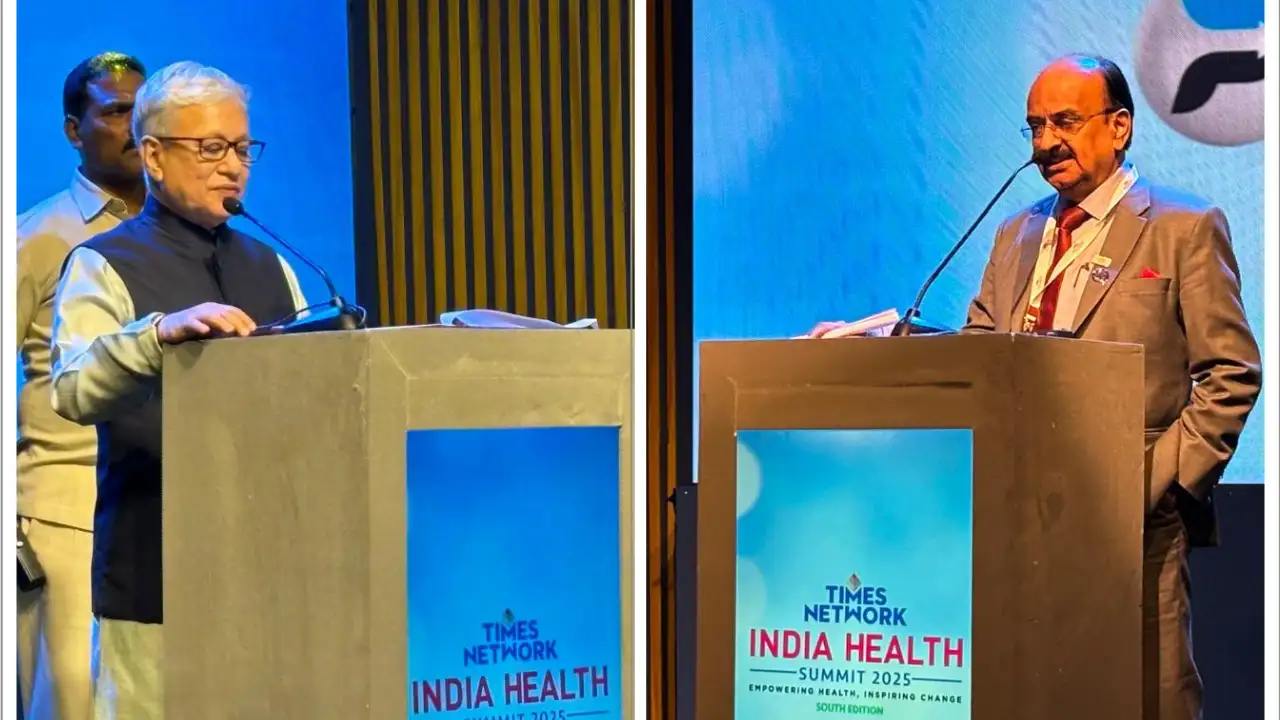
(L to R) Shri Jishnu Dev Varma, Hon’ble Governor of Telangana and Dr Dilip P Bhanushali, President, Indian Medical Association
At the Times Network India Health Summit 2025 - South Edition, representing the voice of thousands of medical professionals across the country, Dr. Dilip P. Bhanushali, President of the Indian Medical Association (IMA), delivered a powerful and deeply relevant opening address.
Dr. Bhanushali opened by highlighting the ongoing initiatives taken by doctors to improve public health access, especially in underserved areas. Among the key programs he mentioned were:
Medical Consultation and Sanitation Prevention Programs: These initiatives focus on preventive care and hygiene education, crucial pillars for disease prevention, especially in rural India.
‘Aapo Gaon Chale’ – The Flagship Outreach: A flagship IMA program that sends doctors to rural villages, bridging the urban-rural healthcare divide by offering essential services where access is minimal.
Blood Banks on a No-Profit Basis: A significant step towards helping economically disadvantaged patients, especially during medical emergencies, by making life-saving blood accessible without profit margins.
Free Medical Camps and TB Eradication Efforts: Regular camps have played a vital role in early diagnosis and disease awareness, while targeted TB programs contribute to India's commitment to eliminate the disease by 2025.
COVID-19 Diagnosis Initiatives: Dr. Bhanushali acknowledged the critical role doctors played during the pandemic in ensuring timely diagnosis and treatment, often at great personal risk.
Spotlight on the Struggles of Doctors
While the contributions of doctors are immense, Dr. Bhanushali didn’t shy away from addressing the grim realities faced by the medical fraternity.
Violence Against Doctors: He referred to the shocking RG Kar Medical College incident in Kolkata, where violence against doctors brought national attention to the vulnerabilities faced by healthcare workers. The public outcry was so strong that it led the Hon’ble Supreme Court to take suo moto cognizance of the issue. However, he lamented that the committee’s report still awaits resolution.
The Burden of the Consumer Protection Act: In its current form, the act has made doctors overly cautious, sometimes forced to recommend unnecessary tests to avoid litigation. This defensive medicine affects both healthcare quality and trust.
The Role of Private Institutions: With 80% of India’s medical care provided by private entities, the system’s sustainability and equity are at constant risk—especially with rising legal and operational pressures on these institutions.
A Call for Policy and Clarity
Mixopathy: Dr. Bhanushali raised serious concerns over the trend of merging medical systems like Ayurveda, Homeopathy, and Allopathy. “We are not against Ayurveda,” he clarified, “but why mix it with Allopathy?” He stressed the need for clear boundaries to protect patient safety and treatment consistency.
Quackery and Antimicrobial Resistance: Unqualified practitioners prescribing steroids and antibiotics without proper diagnosis are worsening the public health crisis, particularly in states like Telangana. This reckless overuse contributes to a dangerous rise in antimicrobial resistance.
GST on Life-Saving Drugs: Addressing the economic barriers to healthcare, Dr. Bhanushali shared that the IMA has requested the GST Council to reduce taxes on essential drugs, including those for cancer, diabetes, and hypertension. The plea remains under consideration.
Low Health Budget Allocation: With health spending still at 1.8% of India’s GDP, Dr. Bhanushali reiterated the IMA’s call to the Finance Minister to significantly raise investment in public health infrastructure and services.
Misinformation in Health Products: Drawing attention to disturbing trends, he mentioned over-the-counter ORS (oral rehydration salts) sold with excessively high sugar content, ironically causing more diarrheal issues. He emphasized the need to adhere to WHO guidelines and monitor unregulated health products in the market.
A Plea for Empathy
Despite the challenges, Dr. Bhanushali ended his address on a hopeful note: “Doctors must continue to lead with the same sympathy and empathy that they are taught.” While the nation depends on them, the medical community seeks acknowledgment, safety, and systemic support.
Hon’ble Governor of Telangana, Shri Jishnu Dev Varma also echoed the same thoughts as he graced the occasion as the Chief Guest and presented 20 awards to distinguished doctors for their outstanding contributions to healthcare.
In his governor address, he commended Telangana's visionary governance in public health, particularly the state's efforts in providing safe and potable water to curb the root causes of waterborne diseases. He highlighted the role of flagship initiatives like Ayushman Bharat and Ayushman Arogya Mandirs, which are transforming primary healthcare delivery through community-based wellness centres.
Acknowledging the growing role of digital health technology, Governor Dev Varma emphasized that while tech is an enabler, empathy must remain at the heart of medicine. “Even with all advancements,” he noted, “a doctor’s empathy is irreplaceable.”
He called for a collective effort to build a Bharat where health is not a privilege but a promise—a system rooted in accessibility, dignity, and compassion. Quoting from the Yajurveda, he invoked a timeless blessing: “May all remain well, be free from diseases, may our minds be uplifted, and may we remain happy forever.”
Get Latest News Live on Times Now along with Breaking News and Top Headlines from Health and around the world.
